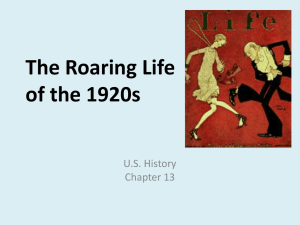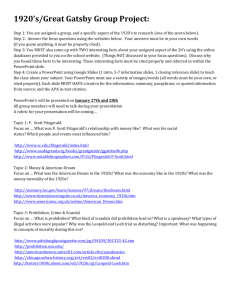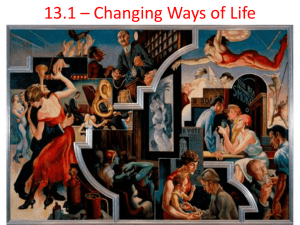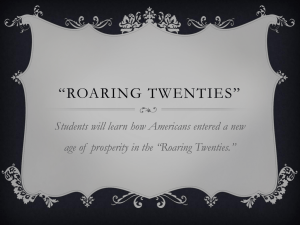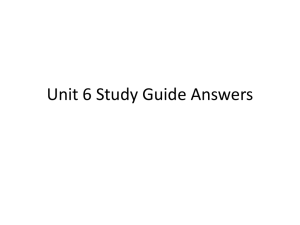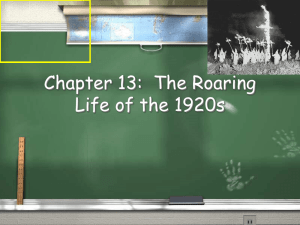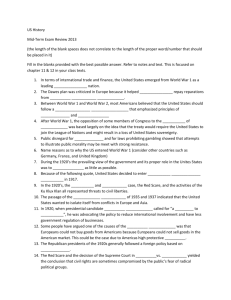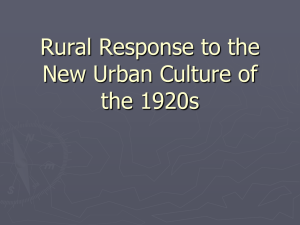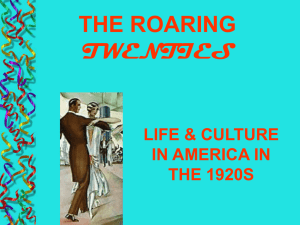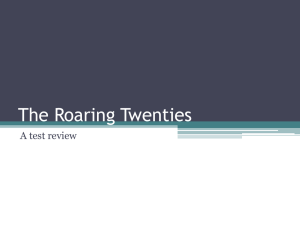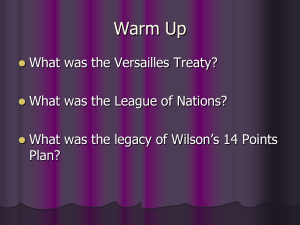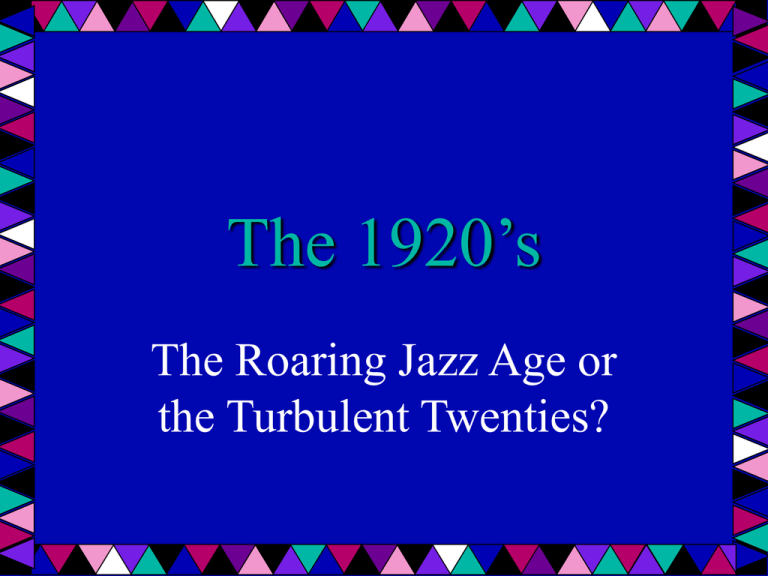
The 1920’s
The Roaring Jazz Age or
the Turbulent Twenties?
What is Happening Here?
What Does This Movie Poster
Suggest About the Era?
The 1920s Must Be….??
Turbulent Decade or Jazz Age?
• Prohibition and Women’s Suffrage usher in the
decade
• US becomes more modern
• Movies, radio, the car, mass production
• Harding, Coolidge and Hoover: Scandals
• The Red Scare
• US stays isolated from foreign affairs
• More Americans lived in towns and cities then in
the countryside
Do we need so many laws??
• Do laws help to prevent crime or
do they assist in the creation of
crime? Explain.
Prohibition and Women’s
Suffrage
PART I
Why Prohibition???
• Began in the progressive era, a time of reform in
America
• Improve social conditions
• Reduce crime & family instability
• Increase economic efficiency
• Purify politics
• Alcohol reduced efficiency of soldiers.
• Progressives, Baptists, Methodists, Protestants,
women’s temperance unions all pushed for
prohibition
Trading Alcohol for Al
Capone
• Prohibition – alcohol is illegal
• 18th Amendment 1/1919
• Volstead Act 10/1919,
established Prohibition Bureau
(Eliot Ness), set penalties
• Speakeasies, bootlegging,
organized crime
• Medicinal uses
• Enforcement issues
• 21st Amendment 1933 –
repealed the 18th
A Raid in Lake Ontario
Was this “noble experiment” a
success???
• Was prohibition a success? What did
the Senate judiciary committee of 1926
feel about the progress of prohibition?
Women’s Suffrage
• Movement began during
colonial times
• Women made great strides
toward equality during
WWI
• 19th Amendment 8/26/20
• "The right of citizens of
the United States to vote
shall not be denied or
abridged by the United
States or by any state on
account of sex."
• 1920 Women vote in
election
A Time of Amendments
Explain the purpose of each of
the following three
Constitutional Amendments:
th
th
st
18 , 19 & 21 . Which do you
feel is the most important?
Explain.
THE USA AFTER WWI
The Economy, The Red Scare,
Immigration and Politics
Part III
BOOM TIMES
“One hundred thousand people flocked into
the showrooms of the Ford Company in
Detroit; mounted police were called out to
patrol the streets of Cleveland, in Kansas
City so a great a mob stormed Convention
Hall that the platforms had to be built to lift
the new car high enough for everyone to
see”
Post WWI Issues
• Communist Russia
– Will Communism infect the
minds of Americans?
• Postwar Economy
– High unemployment
– Inflation
– Low wages
• Labor Unrest
– Worker’s strikes crippled
production
Land of Opportunity?
• Red Scare
– Paranoia and exaggeration caused hysteria
• Bomb Scares – 36 mail bombs discovered
• Bolshevism
– Communist Conspiracy, a call for a worldwide revolution
of workers
– .5% of Americans
• Palmer Raids – raids in 33 cities. 4000 arrests and 560
deportations of “communists”
• Nativism
– National Origins Act 1924
– Limited immigration, European, 2% of the number of
people living in the US from that country (census 1890)
The Red Scare Was….
“A nation-wide anti-radical hysteria
provoked by a mounting fear and anxiety
that a Bolshevik revolution in America
was imminent — a revolution that would
destroy private property, Church, home,
marriage, civility, and the American way
of Life.”
- Historian L.B. Murray
"These attacks will only increase the activities
of our crime-detecting forces"
The Impact of National Origins
Act
Does he have a point?
“Not for at least half a century,
perhaps at no time in our history
had there been such a wholesale
violation of civil liberties”
- Historian William Leuchtenburg
Review Question
What was America so SCARED of
after WWI and in the early
1920s? Why? Name two
consequences of this fear?
3 Strikes!!! – (3,600 in 1919)
• Seattle General –60,000 peaceful
• Boston Police – 75% of officers
– “agents of Lenin”
– “Bolshevik nightmare”
– Strikers did not regain their jobs
• Steel Strike – Pennsylvania, 365,000, Black and
Mexican replacement workers are brought in,
strikers jailed beaten or shot!
• How did these strikes help “fuel” the Red Scare?
Sacco and Vanzetti
Seriously?
“This man Vanzetti, although he may not have
actually committed the crime attributed to
him, is nevertheless morally culpable
[guilty], because he is an enemy of our
existing institutions…..The defendants ideas
are cognate [associated] with the crime”
-Judge Thayer
Returning to Normal and
Keeping it Cool
29 & 30 – Republican Presidents
• “A return to normalcy” – Harding 1920
– The Ohio Gang
– Teapot Dome Scandal – Albert B. Fall
• “Keep it cool with Coolidge” 1924
• “The business of government is business”-Silent
Cal
– Prosperity and Thrift
– Very popular after Harding’s corruption
– “I do not choose to run for president in nineteen twenty
eight”
• Republican capitalism
– High Tariffs – to stimulate domestic business
– Trickle-down “a rising tide floats all boats”
Cars and Consumerism
Part IV
Henry Ford
• Assembly Line
Production- cut production
time in ½
• Model T
• Output
– 1920-1.9 mill
– 1930-5 mill
• Payment Plans
– Workers
• Gave birth to 400,000
miles of new roads
• Road side businesses
Working on the Chain Gang?
“The chain system [assembly line] you have is
a slave driver! My God! Mr. Ford. My
husband has come home and thrown
himself down and won’t eat his supper – so
done out! Can’t it be remedied?……..That
$5 a day is a blessing one bigger than you
know but oh they earn it”
- Wife of a Ford worker
Review Question
• Who said “The business of America is
business”? How did he support this claim?
• The auto industry was one of America’s best
during the decade of the 1920s, use
statistics to support this statement. If you
could hold one person responsible for this
who would it be and why?
Creating Consumers
• 1926 – 75% of cars on credit
• Items that were “pleasing” to look at
• Planned obsolescence – creating something that is
planned to go out of style
• Chain-stores, A&P 14,000 by 1925
• Advertising – pre WWI = $500 million by 1929
$3 billion
– Magazines, newspaper, billboards, radio
– Targeted women
– Slogans, jingles, celebrities
Marketing Wisdom
“To keep America growing we must keep
America working, and to keep America
working we must keep them wanting;
wanting more than the bare necessities;
wanting the luxuries and frills that make life
so much more worthwhile, and installment
selling makes it easier to keep Americans
wanting”
- Car dealer
HOMEWORK
15 POINTS
• DUE FRIDAY 10/1: FIND AN
ADVERTISEMENT IN A RECENT
MAGAZINE OR NEWSPAPER. CUT OUT
THE AD.
– EXPLAIN WHY IT IS AN EFFECTIVE AD
– EXPLAIN WHY YOU CHOSE THAT AD
– IS YOUR AD SIMILAR OR DIFFERENT
FROM THE ADS OF THE 1920’S? EXPLAIN
Women and African
Americans in the 1920s
PART III
Women of the 1920’s
• Women were able to vote and serve on
juries but they gained little influence
• Few women held positions in political
parties or were elected to office
• Women had greater job opportunities but
faced tremendous discrimination at work
• The social lives of women changed most
Flappers – The Exception or the
Rule??
• The “new woman”
• “Stylish, adventurous, independent, career
minded”
• No more corsets, short skirts instead
• Bobbed or short hair style
• Participated in sports and drove cars
• Taxi drivers, teachers, stenographers, pilots etc.
• Most women were still house wives (married &
older, a small percentage were flappers (young &
single)
FLAPPERS
W.E.B. Du Bois
– We Return
– We return from
fighting
– We return
fighting
Historian David Levering Lewis
Wrote….
“In the course of his long,
turbulent career, W. E. B.
Du Bois attempted virtually
every possible solution to the
problem of twentieth-century
racism”
Violence Erupts
• By late 1919 25 Race Riots erupted
• “People [African Americans] were seen to
flee from their burning home, some with
babies in their arms”
• “The colored troops fought nobly [In
WWI]. We have something to fight for
now”
The Great Black Migration
• General trend of
Urbanization
• 1920s 800,000
Blacks moved
North
The Fight For Equality Begins
– NAACP- W E B Dubois (1909)
• Formed the anti-lynching committee
• The Crisis – newsletter which published accounts of
violence
• Appealed to the well educated
– Marcus Garvey (UNIA) -“We shall now organize”
• Aimed to unite all those of African descent worldwide,
lost hope of achieving equality in America
• “Back to Africa”
• Black owned businesses
• Appealed to the working class
• “He made black people proud, he taught them that black
is beautiful”
White Backlash
• 1920 100,000 new members,
fueled by the red-scare
• Nativism – white Protestant
American born, white
supremacy
• The new KKK
– 1920-over 700 lynchings
– North & Mid-West
– Infiltrated all aspects of
society
Review Question
**Yesterday we discussed the challenges
that blacks faced “growing up in the
1920s”. What efforts were made in the
quest for equal rights during this
decade? How did some of “white
America” respond to this?**
“Growing up Black”
What was Daisy Bates’
experience like growing up
black in the 1920s?
Jazz, Sports, Radio and
Religion
Part IV
Harlem Renaissance
• Flourishing of artistic
development
• Glowing pride in black culture“The New Negro”
• Langston Hughes
• Zora Neale Hurston
• Harlem Jazz
–
–
–
–
–
Savoy, Cotton Club
Duke Ellington
Count Basie
Benny Goodman
Louis Armstrong
THE DUKE
IF WE MUST DIE - Claude
McKay
“If we must die, let it not be like hogs
Hunted and penned in an inglorious spot,
While round us bark the mad and hungry dogs….
What though before us lies an open grave?
Like men we’ll face the murderous, cowardly
pack,
Pressed to the wall, dying, but fighting back!”
Langston Hughes
“We build our temples
for tomorrow, strong
as we know how, &
we stand on the top of
the mountain, free
within ourselves”
“The Lost Generation”
• Rise of a new generation of American
Writers
• Reflected gloom of WWI and scorned
“superficial” middle class
• Ernest Hemingway – A Farewell to Arms
• F. Scott Fitzgerald – This Side of Paradise
& The Great Gatsby
1927 – 1st Talkie – The
Jazz Singer
CHARLIE CHAPLIN
AL JOLSON
Sports of the 1920s
BABE RUTH
JIM THORPE
Charles Lindbergh – “Spirit of St.
Louis”, non stop NY – Paris (1927)
Monkey Business
•
•
•
•
•
•
The Scopes Monkey Trial
1925
John T Scopes (teacher)
Dayton, Tennessee
Teaches theory of evolution to his class
Tennessee state law outlawed the
teaching of anything but the Biblical
creation story
• William Jennings Bryan – Prosecutor
(fundamentalist)
• Clarence Darrow (ACLU) – defense
attorney
Science vs. Religion
• Bryan represented many Americans who felt that
evolution contradicted their religious beliefs
• Darrow “Today it’s the public school teachers,
tomorrow the private, the next day the preacher
and the lecturers, the magazines, the books, the
newspapers”
• Scopes loses and is fined $100
• Bryan who was called by Darrow as a witness
came to represent “narrow-minded” Americans
John T Scopes
Darrow
Jennings Bryan

